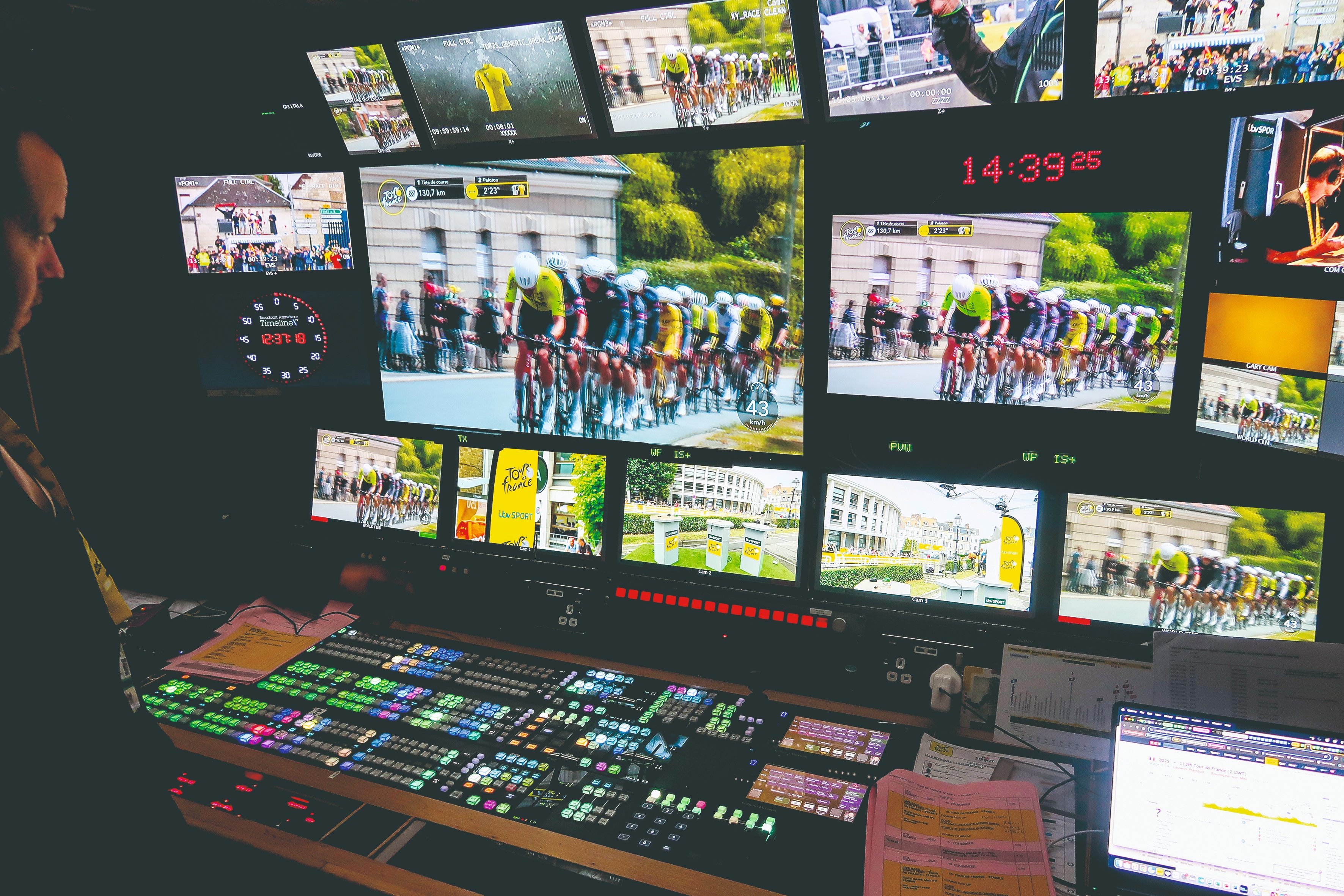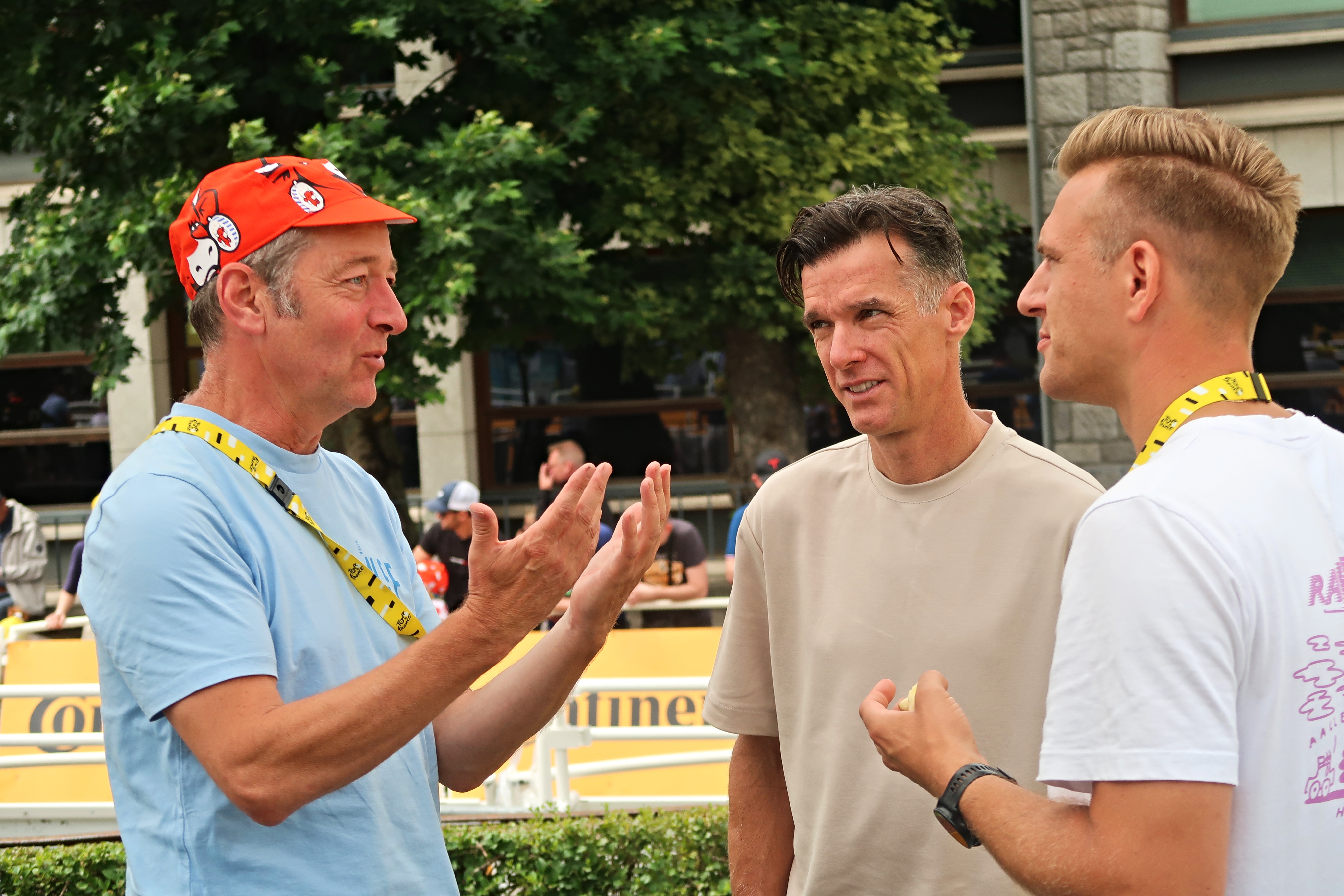Ned Boulting can’t remember the last birthday he celebrated at home. For the past two decades, he has spent the day – 11 July – working for ITV on the Tour de France. On his first few birthdays away from home, the production crew would hurriedly expense him a piece of Tour merch as a gift. “On the third or fourth occasion, I said, ‘If you ever give me another mug, I’m going to smash it in front of you’,” Boulting now laughs. “So that got nipped in the bud.” These days, the date passes “routinely and roundly ignored” – but this year, as his 56th birthday slips by, Boulting’s 23-year streak could finally come to an end.
Last autumn, it was announced that ITV had dropped the rights to broadcast the Tour from 2026. The package was instead sold exclusively to Warner Bros Discovery, the parent company of TNT Sports, in a deal that ended 40 years of free-to-air coverage of the race in the UK. British fans had enjoyed free Tour coverage since it first aired on Channel 4 in the 1980s. The news triggered uproar, and left Boulting and his colleagues feeling both nostalgic and mournful as they set out on their final lap of France.
Come the evening of 27 July, the ITV broadcast truck will pull out of the car park in Paris for the last time. I put it to Boulting that at least he can look forward to celebrating his birthday at home next year. “Absolutely not. No, no,” he snaps back. “That would be the very worst kind of birthday I could imagine.” Why’s that? “I just want to be at the Tour de France. It would feel entirely unnatural not to be at the Tour de France on my birthday.”
At stage two’s finish in Boulogne-sur-Mer, ITV’s pop-up studio sits nestled in the zone technique media village, overlooking the route, 250m from the finish line. In three hours’ time, the riders will arrive, and Mathieu van der Poel will take the stage and the yellow jersey. Until then, there’s a campsite-like calmness among the TV vans.
One of the crew members strolls around barefoot, his wet socks drying over a metal fence, sodden after spending two hours assembling the set in the rain. There’s an astroturf carpet on the floor, a gazebo overhead, and thick, black cables leading to a large white truck. Inside, a kaleidoscope of screens play different scenes from the race. Boulting arrives fresh from lunch in a Laughing Cow-branded cap, a freebie snatched from the Tour’s publicity caravan – and one he is evidently attached to, choosing to keep it on for Cycling Weekly‘s photos.
(Image credit: Tom Davidson)
The announcement of ITV’s rights loss to TNT Sports last October came “out of the blue” for Boulting. In the moments that followed the news, he received a text from his co-commentator David Millar that read: “I thought that it was a forever job”. In reality, the writing had been on the wall.
“Our producers always share the viewing figures with us, and it was clear, from the peaks of 2014, there had been a very gentle but steady and prolonged decline in free-to-air interest,” Boulting says. On stage one, more than 600,000 viewers tuned in for the start of the race in Lille. The audience, Boulting points out, is “still very big – but at the same time, I knew that the price of renewing the rights was rising much more quickly, as a result of, I guess, pressure from subscription television and ASO [the Tour’s organiser] just upping the ante each time.”
The latest race content, interviews, features, reviews and expert buying guides, direct to your inbox!
Though he wasn’t involved in discussions, Boulting could see his channel’s coverage had reached a “tipping point”. “I gathered that for the last couple of years it had started to make a slight loss for ITV, so it was always vulnerable to cost-cutting,” he says. When that moment eventually came, fans felt it like a punch in the gut: “tragic”, “a massive shame”, “the end of an era”, they wrote on social media. A petition was launched in a bid to make the Tour de France a ‘Category A event’ under the British broadcasting code, a move that would effectively enforce free-to-air coverage. The topic was even debated in Parliament – “as if there’s not more important things in the world than this,” Boulting laughs – but the motion was swiftly dismissed.
From 2026, cycling fans will have to pay £30.99 to watch the Tour live on TNT Sports. Even those willing to pay to follow the race have been left frustrated – discovering that TNT’s Tour coverage is interrupted by ad breaks. Casual viewers tuning in just for the race or chancing upon the coverage while flicking through their free channels will soon be a thing of the past.

(Image credit: Tom Davidson)
Free-to-air timeline
1985 – Channel 4 begins daily highlights of the Tour de France
2000 – Tour highlights get pushed to later slots to make way for test match cricket
2001 – Channel 4 relinquishes Tour de France rights. ITV pays £5m to take over live coverage
2003 – Ned Boulting makes Tour debut as an on-the-ground reporter, mistakenly calls the leader’s jersey ‘the yellow jumper’
2016 – Boulting replaces Phil Liggett as lead commentator, aided by David Millar
2024 – Warner Bros. Discovery announces exclusivity deal to show the Tour in the UK, ending free-to-air broadcasts
2025 – ITV sets out on farewell Tour
2027 – Tour set for UK Grand Départ (Edinburgh), potentially with no free-to-air option
I’m reminded of David Millar’s 6ft 4in height as he ducks beneath the ITV gazebo. Back in the early 1990s, then a teenager, he was one of the viewership’s budding fans. “It was the days when you only had four TV channels. I’d just come back from Hong Kong, where I was brainwashed into mountainbiking, and I’d just got into road cycling,” he remembers.
Watching the Tour on TV, the young Scot found himself spellbound by Miguel Induráin, the powerful time triallist who won five Tours in a row. “I thought he was just amazing. He was so dignified,” says Millar. “I’d never seen a sport like it, and the Channel 4 show was so accessible.” Millar would go on to feature on the show himself, first as a rider, winning the prologue time trial and first yellow jersey on debut in 2000, and later as a commentator, alongside Boulting.
Millar isn’t the only successful British rider who was introduced to pro road racing by free-to-air TV coverage. Picnic PostNL’s Oscar Onley was similarly inspired. “I always used to watch the highlights on ITV after school every evening, from 2010, until I left school,” says the 22-year-old. “My mum tells me that a lot of her friends ask where they can watch me race. Obviously for the other races during the Tour, they’re on TNT, and you have to pay for it, whereas the Tour you never had to pay for.”
It’s a barrier of entry that might stop today’s school kids from watching bike racing and pursuing careers in it. Come 2027, with the Tour’s Grand Départ on home turf in Scotland, it’s possible – likely even – that Onley will line up with no free broadcast for local fans. “I hope there’s something in the future with free-to-view coverage again,” the Scot says. “I think to get non-cycling people into cycling, or just to see what we do, that’s how you’re going to do it.”

(Image credit: Tom Davidson)
Back in Boulogne-sur-Mer, the first team buses are arriving at the finish line. Fans thump on the hoardings as they pass in front of ITV’s studio, and trundle slowly beside the city’s stone ramparts. Wandering through the trucks, retired sprinter Marcel Kittel pokes his head around a flailing banner, and is warmly pulled into conversation with Boulting and Millar. The pair break the news that their ITV days will soon be over. But there’s a silver lining, they explain: they’re working on a new project, a live video podcast, that they plan to produce at the Tour next year. Think Test Match Special, but filmed in a village along the race route.
If all goes well, Boulting will spend his 57th birthday at the race he loves – and as many birthdays as possible thereafter. The excitement softens the blow of losing the ITV gig, but it won’t make the final day in Paris later this month any less emotional. “Even in a normal year, I find that Monday morning after the Tour entirely disorientating and tinged with melancholy,” he says.
It will take less than an hour for the crew to dismantle the pop-up set. They’ll roll up the astroturf, pull down the gazebo, and bundle the cables together. Boulting, Millar, and the whole 30-strong cast of ITV’s production will then bid adieu to their travelling circus. “The sense of loss of an institution is enduring in a way that has taken me by surprise,” Boulting says. For many cycling fans, next summer will be the first time in their lives the Tour has disappeared behind a paywall. Fan response has already shown that free-to-air coverage will be sorely missed. Its loss will also prove costly, narrowing the sport’s reach and dimming the spark of inspiration for the next generation of British riders.
Behind the theme song
ITV’s punchy accordion jingle has been the summer soundtrack to UK living rooms for over two decades. The song is called ‘Beat Route’ – a meaningless play on words – and it was composed by Jeff Ashitey, a Surrey-based music producer. “We made it in south London in a studio that was in a flat,” Ashitey remembers. He was one of just three people in the room, together with a sound engineer and a French accordionist. “Once we put the accordion down, it kind of steered in a direction. It grew organically on its own.”
Ashitey cut together the full version and trimmed down shorter clips for the ad breaks – the latter would end up as a ringtone too, which rose to third in the iTunes ringtone charts. Was he surprised by how well the song was received? “It wasn’t until [my wife] Dawn went to work for Cycling Weekly that I realised it had become the Match of the Day for cyclists,” he says. “I’ve made a few quid from it… They always used to laugh at Dawn in the office coming up to the Tour, saying, ‘Where are you going on holiday this year with your money?’”
With the loss of ITV’s Tour coverage, the theme tune of summer is set to disappear too. “I don’t want it to die. I don’t want it to just disappear,” says Ashitey. “It represents the Tour, and especially for a lot of British people who don’t necessarily have TNT.” The accordion melody, he hopes, will live on, at least in memory.
This feature originally appeared in Cycling Weekly magazine on 17 July. Subscribe now and never miss an issue.
